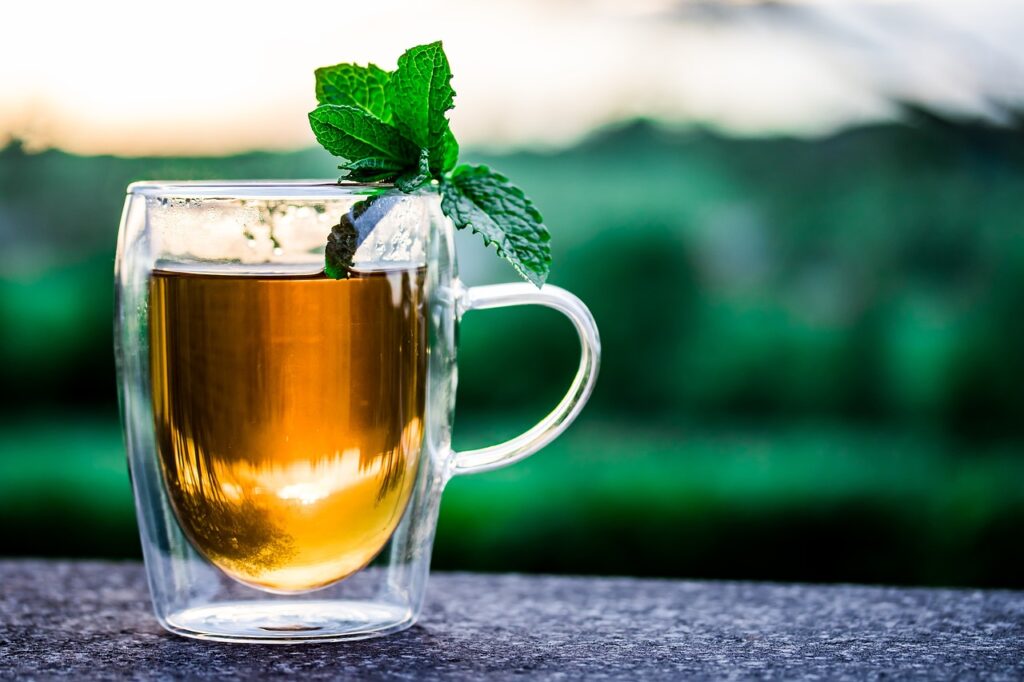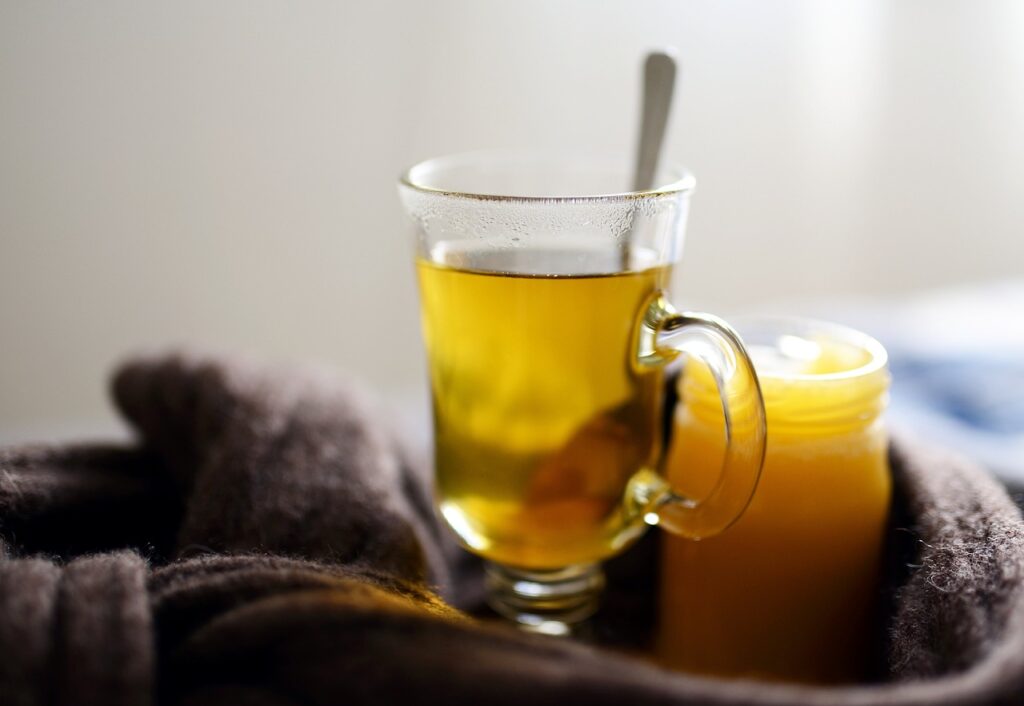Tea for Flu is best for health. As flu season draws near, many of us seek natural remedies that will ease symptoms and facilitate quick recovery. Tea, with its soothing qualities and variety of health benefits, has long been a valuable weapon in the fight against the flu. We will explore some effective types of tea for fighting flu that may ease symptoms, as well as some frequently asked questions to ensure optimal results from this natural remedy.
Why tea is beneficial in treating the flu
People have long recognized tea as an all-natural remedy for various illnesses, ranging from colds and flu to anxiety and stress relief. A hot cup can ease congestion, hydrate your body, promote relaxation, and even provide anti-inflammatory benefits—all essential elements when suffering from flu symptoms. There are even teas with anti-inflammatory properties and ingredients that enhance immunity, which may expedite the recovery process! Here’s how tea can aid those living with the virus:
Hydration: Hydration is essential when fighting off illness, including influenza. Flu can cause sweating, fever, and dehydration, which only makes symptoms worse. Warm tea is an ideal way to stay hydrated for recovery purposes and is an essential way to remain hydrated during a recovery journey.
It relaxes the throat: Tea is one of the best remedies to relieve sore throat symptoms associated with flu, helping soothe irritation and ease swelling in the throat. People have long recognized herbal teas for their relaxing properties that provide instant relief.
Tea Can Boost Immunity: A variety of tea varieties, particularly green varieties, contain high concentrations of antioxidants such as polyphenols and catechism, which can strengthen your immune system by fighting off bacteria and viruses. They can also reduce the severity and duration of influenza symptoms.
Helps with Congestion: Flu-related nasal congestion is often associated with breathing difficulties, making breathing harder. Tea’s steam can help loosen and clear away mucus build-up in nasal passages to make breathing simpler.
Stress Relief: Tea is an excellent way to relax. The stress associated with acute illness can be extremely draining, leading to significant drops in immune function. Consumption of tea as a relaxing activity has proven immensely effective at decreasing levels of tension; lavender- or chamomile-based blends, in particular, have become popular for their soothing qualities.

Best Teas for Flu Relief
Now that we understand the many advantages of tea, we can explore which varieties can provide relief from flu-related symptoms.
1. Ginger Tea
Ginger is a reliable remedy for soothing stomach upset and nausea caused by illness, as well as possessing anti-inflammatory and antibacterial properties that help combat inflammation and influenza virus infections. Additionally, studies have shown that drinking ginger tea can help clear mucus from airways and soothe sore throats.
What is the recipe for ginger tea?
Combine bubbly slices of freshly-split ginger with water in a pan for approximately 10 minutes to form a paste.
Strain the tea and add lemon or honey for additional therapeutic effects.
2. Peppermint Tea
Peppermint is an excellent tea to help ease flu-related symptoms. Packed full of menthol, which opens nasal passages for easier breathing, peppermint also has cooling effects that may reduce fever and ease sore throat discomfort; plus its gentle stomach-soothing qualities could even ease nausea symptoms.
How should one prepare peppermint tea?
To brew a soothing, aromatic tea in five minutes or less, place fresh peppermint leaves or tea bags into boiling water and simmer for five minutes.
Add honey as desired.
3. Chamomile Tea
Widely acclaimed for its relaxing properties, chamomile tea serves as an excellent solution for sleep issues or fatigue resulting from flu-related symptoms. Anti-inflammatory agents packed in chamomile reduce throat swelling, offering yet another effective remedy for sore throats!
Method to Create Chamomile Tea:
Before steeping chamomile flowers in herbal tea or any other beverage of your choice, steep them in hot water for 5 to 10 minutes.
An additional soothing boost may come from adding one teaspoon of honey.
4. Echinacea Tea
Echinacea, commonly known for its anti-inflammatory properties, could potentially reduce flu and cold symptoms significantly by increasing production of white blood cells that fight infection—making this herb an excellent way to both prevent and treat flu.
Method to Create Echinacea Tea:
Make a stew out of dried Echinacea flowers or roots by boiling in hot water for five to ten minutes.
Honey or lemon for flavor!
5. Lemon and honey tea.
People have long recognized the effectiveness of this simple solution for soothing sore throats and flu-like symptoms. Lemon provides vitamin C, which can boost immunity, while honey acts as an antimicrobial to soothe throat irritation.
Method to Make Lemon and Honey Tea:
Mix several slices of lemon in hot water.
Mix in one teaspoonful of honey and drink.
6. Green tea
Green tea contains antioxidants known as catechism that can strengthen your immune system while fighting infection. Sipping green tea regularly can strengthen the body’s defenses against influenza virus infections while its anti-inflammatory properties help ease symptoms such as congestion and sore throat.


What is the ideal method for making green tea?
Boil green tea leaves, tea bags, or loose-leaf tea for two to three minutes in boiling water before straining out of the strainer and drinking as normal.
Include lemon, honey, or ginger to increase health benefits.
7. Turmeric Tea
Turmeric is a potent anti-inflammatory drug, effective against flu-related inflammation. Additionally, turmeric’s active ingredient cur cumin improves immunity while diminishing the severity of flu symptoms.
What is the best way to prepare turmeric tea?
Combine 1 tablespoon of turmeric powder with one cup of hot water in order to form an infusion.
Include black pepper, honey, or ginger to boost flavor and efficiency.
How Often Should You Drink Tea to Treat the Flu?
When sick, for maximum effectiveness in taking tea as medicine, aim to consume 3 to 4 cups a day—you can mix and match various varieties for variety while reaping all its healthful advantages. Be sure to drink plenty of water alongside your tea to stay properly hydrated.
Additional Tips for Flu Recovery
Recharge: Your System To help boost immunity against illness, it is important that your body gets ample rest. This allows the immune system to effectively combat illness.
Eat nutritious, vitamin-rich food to assist your body’s healing. Include fruits, vegetables, and lean protein in your daily meal plan as a part of its healing.
Steam Inhalation: Tea’s steam can help open nasal passages and alleviate congestion.
FAQs About Tea for Flu
1. What kind of tea should I drink to treat flu symptoms?
The ideal type of tea depends on each individual’s symptoms; some will work better than others.
Peppermint, ginger tea, and chamomile teas are among the best remedies for relieving flu-related symptoms. Not only will these soothing teas hydrate and soothe sore throats, but they can also reduce inflammation while strengthening immune systems.
2. Am I required to drink tea when suffering from an illness?
Drinking warm tea can help keep you hydrated and reduce fever symptoms. Herbal teas, like peppermint or chamomile, are known to provide cooling effects and induce relaxation, which in turn help ease symptoms associated with fever.
3. Do I need to drink green tea when suffering from influenza?
Green tea is an excellent source of antioxidants, helping strengthen immunity against flu and colds. Just be wary about taking too much caffeine at one time, as too much could impact other areas of your life.
4. Does honey taste beneficial with my tea if I am sick?
Honey is an antimicrobial ingredient with natural healing powers that can ease throat discomfort. Plus, its sweet taste will add a welcome note during recovery!
5. What can ginger tea do to help fight influenza?
Ginger contains antiviral and anti-inflammatory compounds that help soothe throat irritation while simultaneously decreasing nausea and increasing circulation, all while supporting recovery from flu symptoms.
6. Could tea help fight flu?
Even though tea can help alleviate symptoms and boost immunity, it cannot treat flu. Instead, it should be part of an overall flu treatment program including rest, hydration, and possibly antiviral medicines prescribed by your physician.
7. What amount of tea should I drink to reduce flu symptoms?
Consuming tea every two to three hours throughout the day can help ease flu symptoms. Make sure to drink a variety of teas to address symptoms such as sore throats, congestion, fatigue, and sore throats.


Conclusion
Tea is a soothing natural remedy that can provide relief for some of the uncomfortable symptoms associated with influenza. From ginger tea for anti-inflammatory benefits and peppermint for congestion relief to chamomile tea’s relaxation properties, adding tea into your recovery plan may bring much-needed comfort. Just remember to drink plenty of water as well as rest, and seek medical advice should symptoms persist or worsen.
Tea can help combat flu, support recovery, and provide an uplifting and relaxing experience. Make tea part of your daily routine to fight it effectively!

